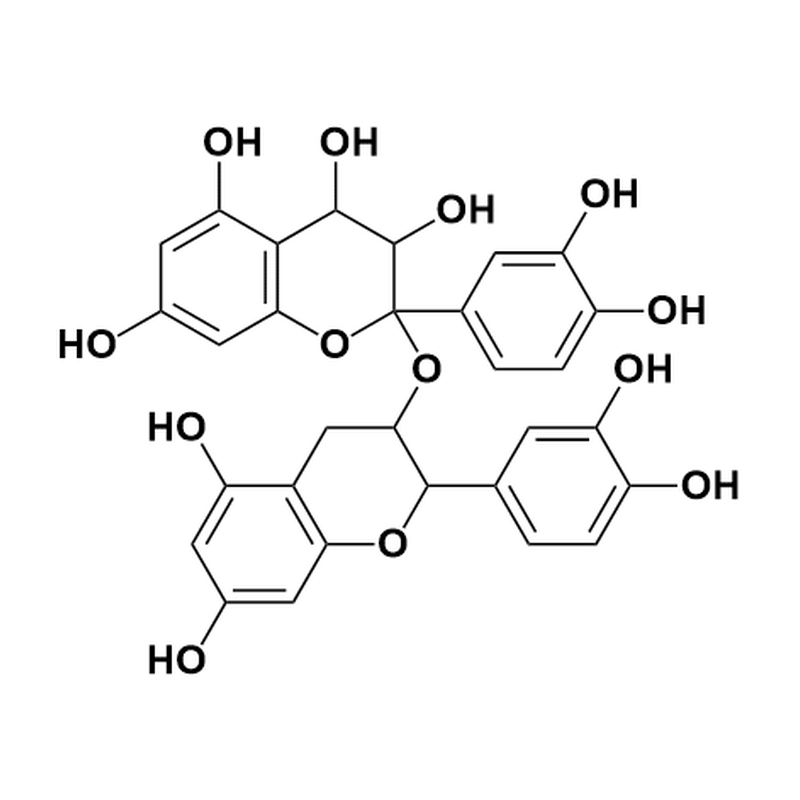产品
编 号:F250672
产品类型
规格
价格
是否有货
5mg
询价
询价
10mg
询价
询价
50mg
询价
询价
100mg
询价
询价
结构图

CAS No: 20347-71-1
产品详情
生物活性:
Proanthocyanidin (Procyanidin) are a class of polyphenolic that are widely distributed in higher plants, consisted of an electrophilic flavanyl unit. Proanthocyanidin can be used as antioxidant and anti-cancers agent. Proanthocyanidin also exhibit anti-inflammatory, cardioprotective, antibacterial and antifungal properties, which can be used in the treatment of chronic venous insufficiency, capillary fragility, sunburn and retinopathy..
体内研究:
The effects of cacao liquor Proanthocyanidin on 2- amino-1-methyl-6-phenylimidazo [4,5-b] pyridine-induced mutagenesis in vivo carcinogenesis in female Sprague-Dawley rats are investigated. In the Ames assay, Proanthocyanidin shows strong antimutagenic effects when assayed in the presence of S-9 mixture. They also inhibit significantly rat pancreatic carcinogenesis in the initiation stage, but not mammary carcinogenesis.
体外研究:
Proanthocyanidin are present in plants as complex mixtures of polymers. Predominant food sources are red wine, tea, chocolate and fruits like grapes, apples, pears, and cranberries.?The most interesting antibacterial activity of Proanthocyanidin is related to their presence in cranberries (Vaccinium macrocarpon Ait.). A number of clinical trials have demonstrated the effectiveness of cranberry consumption in preventing urinary tract infections (UTIs). Although UTIs can be caused by many microorganisms, more than 85% are caused by Escherichia coli. The presence of P-fimbriae on E. coli, which are proteinaceous fibers on the bacterial cell wall, has been clearly established as a virulence factor, since they are responsible by producing adhesions for adherence to uroepithelial cells. Recently, it is demonstrated that cranberry Proanthocyanidin might inhibit P-fimbriated E. coli from adhering to uroepithelial cells. The antiadhesion activity of cranberry juice appears to be related to the presence of Proanthocyanidin with at least one A-type linkage.
Proanthocyanidin (Procyanidin) are a class of polyphenolic that are widely distributed in higher plants, consisted of an electrophilic flavanyl unit. Proanthocyanidin can be used as antioxidant and anti-cancers agent. Proanthocyanidin also exhibit anti-inflammatory, cardioprotective, antibacterial and antifungal properties, which can be used in the treatment of chronic venous insufficiency, capillary fragility, sunburn and retinopathy..
体内研究:
The effects of cacao liquor Proanthocyanidin on 2- amino-1-methyl-6-phenylimidazo [4,5-b] pyridine-induced mutagenesis in vivo carcinogenesis in female Sprague-Dawley rats are investigated. In the Ames assay, Proanthocyanidin shows strong antimutagenic effects when assayed in the presence of S-9 mixture. They also inhibit significantly rat pancreatic carcinogenesis in the initiation stage, but not mammary carcinogenesis.
体外研究:
Proanthocyanidin are present in plants as complex mixtures of polymers. Predominant food sources are red wine, tea, chocolate and fruits like grapes, apples, pears, and cranberries.?The most interesting antibacterial activity of Proanthocyanidin is related to their presence in cranberries (Vaccinium macrocarpon Ait.). A number of clinical trials have demonstrated the effectiveness of cranberry consumption in preventing urinary tract infections (UTIs). Although UTIs can be caused by many microorganisms, more than 85% are caused by Escherichia coli. The presence of P-fimbriae on E. coli, which are proteinaceous fibers on the bacterial cell wall, has been clearly established as a virulence factor, since they are responsible by producing adhesions for adherence to uroepithelial cells. Recently, it is demonstrated that cranberry Proanthocyanidin might inhibit P-fimbriated E. coli from adhering to uroepithelial cells. The antiadhesion activity of cranberry juice appears to be related to the presence of Proanthocyanidin with at least one A-type linkage.
产品资料

